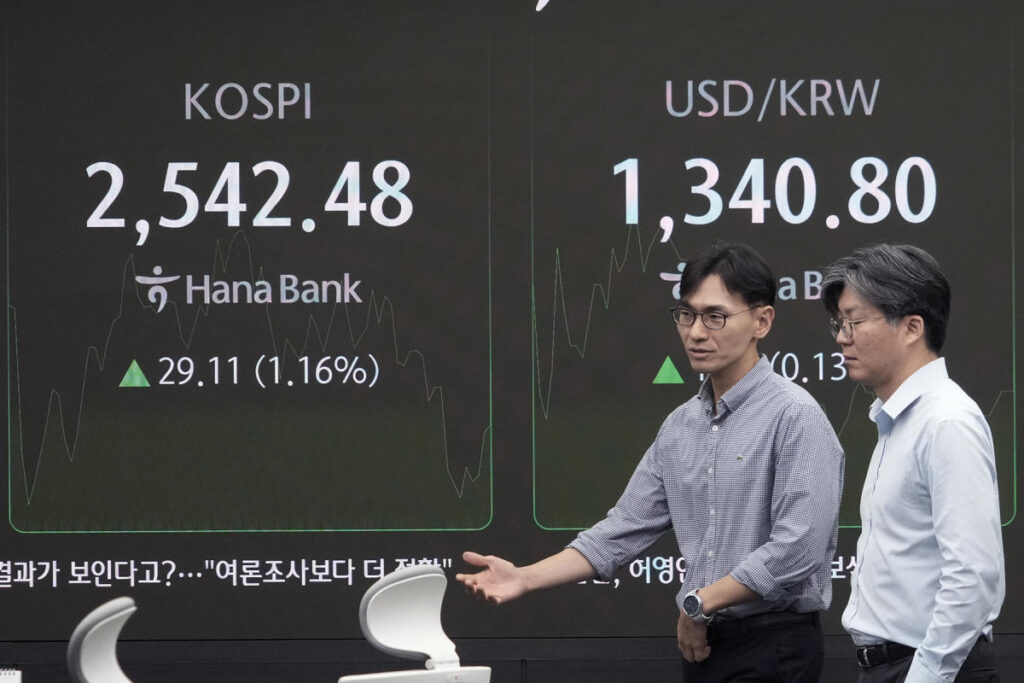TOKYO (AP) — Asian shares mostly rose on Thursday, encouraged by gains on Wall Street led by a handful of influential Big Tech companies.
Japan’s benchmark Nikkei 225 soared in early trading, adding 2.8% to 36,605.62, although the sharp gains were partly a reflection of earlier sharp drops.
The cheap yen was a boon for some issues, as it boosts the value of overseas earnings when converted into yen. Toyota Motor Corp. jumped 2.8%, while Nintendo Co. edged up 1.2%.
In currency trading, the U.S. dollar rose to 142.53 Japanese yen from 142.28. The euro cost $1.1016, inching down from $1.1017.
Shares in Nippon Steel Corp. were little changed after Keidanren, a group of Japan’s top businesses, expressed in a letter to U.S. Treasury Secretary Janet Yellen concerns about “political interference” in Nippon Steel’s proposed acquisition of U.S. Steel Corp. U.S. Steel issues finished nearly 7% higher a day earlier.
“America’s investment climate will be severely tarnished if such political interference prevails,” according to the letter, which was also signed by the U.S. Chamber of Commerce, Global Business Alliance, Alliance for Automotive Innovation and other groups.
Yellen oversees the government committee reviewing the takeover, while the White House recently signaled an openness to blocking the acquisition.
In the rest of the region, Australia’s S&P/ASX 200 rose 0.7% to 8,041.10. Hong Kong’s Hang Seng jumped 1.0% to 17,283.46, while the Shanghai Composite was little changed at 2,720.40.
On Wall Street, the S&P 500 rallied 1.1% after erasing a morning wipeout of 1.6%. A majority of the index’s stocks still finished lower for the day, but the performances by Nvidia and other tech stocks were enough to drive it to a third straight gain and back within 2% of its all-time high set in July.
The Dow Jones Industrial Average rose by 124 points, or 0.3%, after rallying back from a drop of 743 points. The Nasdaq composite jumped 2.2%.
In the latest government report on U.S. inflation, overall inflation slowed to 2.5% in August from 2.9% in July, a touch better than expected. But prices rose more than expected from July into August when ignoring food and energy, and economists say that can be a better predictor of where inflation is heading.
The data seemed to confirm the U.S. Federal Reserve will likely cut its main interest rate at its meeting next week, which would be the first such cut in more than four years. A worry is that it may prove too late, with U.S. shoppers already struggling under the weight of high prices.
Big Tech also once again lifted Wall Street. A handful of these behemoths accounted for most of the S&P 500’s return through the early part of this year, in large part on excitement about the artificial-intelligence boom.
Besides the 8.1% jump for Nvidia, gains of 2.8% for Amazon, 2.1% for Microsoft and 6.8% for Broadcom were the strongest forces lifting the S&P 500.
All told, the S&P 500 rose 58.61 points to 5,554.13. The Dow rose 124.75 to 40,861.71, and the Nasdaq composite jumped 369.65 to 17,395.53.
In the bond market, the yield on the 10-year Treasury rose to 3.66% from 3.64% late Tuesday. The two-year yield, which more closely follows expectations for Fed action, rose more, to 3.65% from 3.59%.
In energy trading, benchmark U.S. crude gained 19 cents to $67.50 a barrel. Brent crude, the international standard added 26 cents to $70.87 a barrel.
___
AP Business Writer Stan Choe contributed.
Read the full article here

